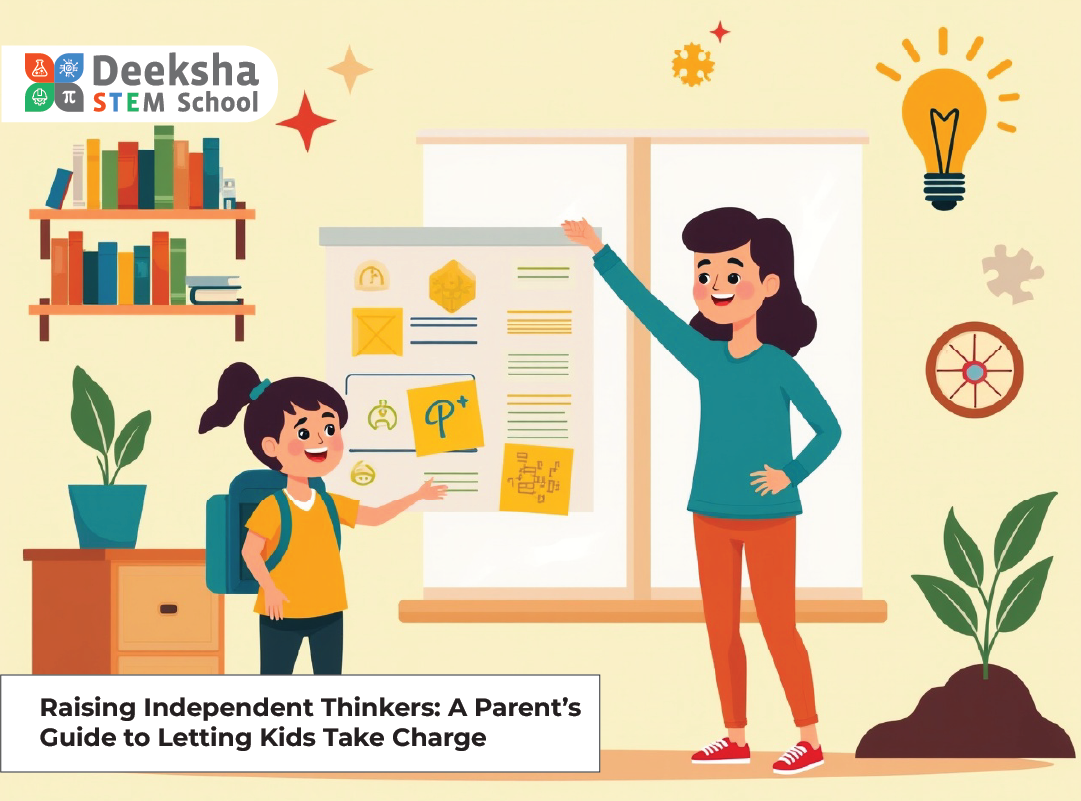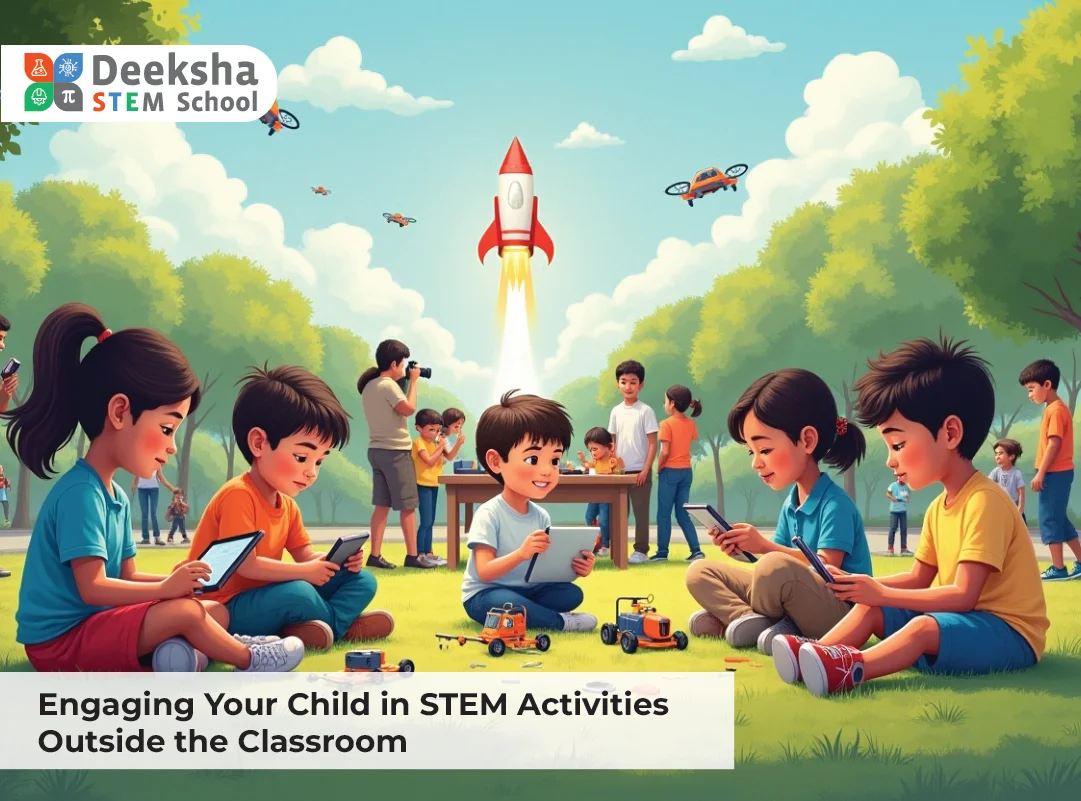Nurturing Emotional Intelligence: A Key to Long-Term Success

In today’s competitive and ever-changing world, success cannot be measured by test scores alone. While academic brilliance and technical proficiency are important, emotional intelligence (EQ)—the capacity to understand and manage one’s own emotions and empathize with others—has become a defining factor in achieving both personal and professional success. Studies have repeatedly shown that individuals with high EQ are better equipped to handle stress, communicate effectively, and form meaningful relationships.
At Deeksha STEM Schools, we believe that nurturing emotional intelligence is not just an educational priority—it’s a life necessity. Our commitment to holistic development ensures that students grow into not only capable learners but also compassionate, confident, and emotionally resilient individuals.
What Is Emotional Intelligence?
Emotional intelligence encompasses a wide array of skills and attributes. These include the ability to:
- Recognize and label personal emotions accurately
- Regulate and express emotions in a constructive manner
- Identify and understand the emotions of others
- Practice empathy and compassion
- Navigate social complexities with ease
- Communicate feelings and needs clearly
- Develop healthy relationships based on mutual respect
These competencies significantly affect a child’s performance in school, ability to adapt to change, and overall well-being. Children who develop these traits early are more likely to grow into balanced, grounded, and successful adults.
Why Emotional Intelligence Matters More Than Ever
With growing academic pressures, exposure to social media, and fast-paced lifestyles, today’s children are facing emotional challenges at an earlier age. EQ helps them cope with these demands effectively. Here’s how emotional intelligence influences various aspects of a child’s life:
| Aspect | Impact of Strong Emotional Intelligence |
| Academic Performance | Enhances concentration, reduces anxiety during exams, improves group collaboration |
| Social Skills | Encourages sharing, cooperation, conflict resolution, and the ability to make and keep friends |
| Resilience & Adaptability | Equips children to handle setbacks, transitions, and new environments with a positive attitude |
| Leadership & Confidence | Empowers students to take initiative, inspire peers, and navigate leadership roles gracefully |
| Mental Well-being | Builds emotional strength, reduces negative coping mechanisms, and promotes psychological wellness |
EQ is often what separates individuals who merely survive from those who thrive in various life situations. The good news? It can be nurtured with intention and the right support systems.
How Deeksha STEM Cultivates Emotional Intelligence
At Deeksha STEM Schools, EQ development is integrated into everyday learning. We don’t isolate emotional learning into a separate subject—we embed it into every interaction, project, and classroom experience. Here’s how:
- Daily Circle Time: A safe and inclusive forum where students openly express their feelings, discuss daily challenges, and build emotional vocabulary.
- Role-Playing & Dramatics: Imaginative scenarios and theatre-based exercises help students understand diverse perspectives and build empathy.
- Mindfulness & Reflection: Practices like guided meditation, breathing exercises, and gratitude journaling encourage inner peace and awareness.
- Peer Mediation & Conflict Resolution: Students are trained to mediate small conflicts, fostering accountability and peaceful problem-solving.
- Teacher Mentorship: Educators receive training to guide emotional development, provide support in emotional moments, and model EQ in their conduct.
- Integrated Project Work: Collaborative learning activities require students to navigate emotions like frustration, excitement, and disappointment together.
- Feedback & Reflection Time: Students are encouraged to reflect on their emotional responses during team activities and academic challenges.
By normalizing emotional conversations and building healthy habits, Deeksha STEM cultivates a nurturing environment where emotional intelligence flourishes.
Practical Ways Parents Can Support EQ at Home
Parents are children’s first emotional coaches. Supporting EQ at home creates consistency and reinforces what children learn at school. Here are some effective strategies:
- Name the Feelings: Help children identify a wide range of emotions—not just happy, sad, or angry, but also frustrated, excited, anxious, or proud.
- Listen Without Judging: Validate your child’s feelings without rushing to solve or correct. Sometimes, just being heard is enough.
- Be Emotionally Transparent: Talk about your own feelings and how you manage them, so your child learns by example.
- Create a Calm Environment: Regularly include quiet time, creative play, and emotional check-ins as part of your family routine.
- Use Stories & Media: Discuss characters’ emotional decisions in books or shows to make conversations about feelings relatable.
- Praise Emotional Growth: Acknowledge when your child shows empathy, controls anger, or solves a problem respectfully.
- Encourage Open Dialogue: Make space for family discussions about emotional wins and struggles without fear of judgment.
Children who are emotionally supported at home become more confident, independent, and prepared to handle life’s ups and downs.
Frequently Asked Questions
1. What’s the best age to start teaching emotional intelligence?
- Children begin learning emotional skills from birth through their interactions with caregivers. Early childhood (ages 2–7) is particularly critical, but it’s never too late to start. Emotional intelligence evolves through every stage of development.
2. Can emotional intelligence be taught, or is it innate?
- While some children may naturally possess stronger emotional awareness, EQ is highly teachable. With regular practice, guided conversations, and a supportive environment, all children can enhance their emotional intelligence.
3. How do you measure emotional intelligence in students?
- Rather than using traditional tests, we assess EQ through observation, teacher feedback, peer interactions, self-reflection journals, and group projects. Progress is seen in behavior, empathy levels, and social participation.
4. Is EQ more important than IQ?
- IQ might get a child into a competitive school, but EQ determines how well they handle the pressure. EQ drives motivation, decision-making, resilience, and interpersonal success. Ideally, both IQ and EQ should be developed in tandem.
5. How does Deeksha STEM integrate emotional learning with academics?
- From group science projects to public speaking assignments, we include emotion-based learning outcomes. We encourage reflection after each academic challenge to help students process what they felt, how they responded, and what they learned.
Final Thoughts
Emotional intelligence is not just a helpful skill—it’s a life-enabling trait that defines how children handle pressure, relate to others, and understand themselves. It’s what helps them bounce back from failure, thrive in a team, and lead with empathy.
At Deeksha STEM Schools, we take pride in growing both hearts and minds. We understand that the most successful learners are not just those who master equations or theories—but those who show compassion, resilience, and courage.
We invite you to explore our campuses at Bannerghatta Road, Judicial Layout, Kengeri, and Vidyanagar to discover how we nurture emotionally intelligent future leaders who are as kind as they are capable.




